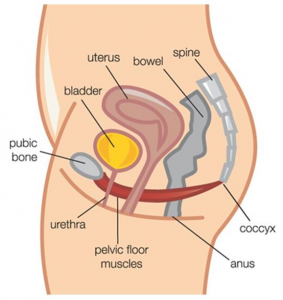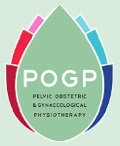I’m always surprised to meet pregnant women who admit they are not doing their pelvic floor muscle (pfm) exercises, despite the risks they run if they don’t. This post aims to motivate you to start doing your pfm exercises, wherever you are in the pregnancy/childbirth/life-cycle. In a nutshell:
Why do pelvic floor muscle excercises?
- To avoid developing urinary incontinence or problems with your waterworks either whilst you’re pregnant, postnatally or later in life.
- To reduce the risk of developing a pelvic organ prolapse (that’s when either your bladder, bowel or womb bulge into your vagina), which can be most uncomfortable (if not distressing) and may stop you doing a number of activities.
- To avoid having to have surgery for either of the above!
- Last but not least, to improve your sex life.
Seriously. There’s a lot of high quality research which spells out the benefits of doing pfm exercises, including government health guidelines which state that all women in their first pregnancy should be taught how to do them. If you need convincing, watch the video clip post made by one of my postnatal patients (‘Patient recommends pelvic floor MOT’).
The facts
- one in three women will suffer from urinary incontinence in their lifetime. (Sadly, this is one of the main reasons why women are admitted into nursing homes when they’re older.)
- one in two will develop a pelvic organ prolapse (although not all women will be troubled by symptoms).
This is no laughing matter! So what do you need to know?
What is the pelvic floor?
A hammock of muscles between your legs which stretches from your pubic bone at the front to the base of your spine (your coccyx) at the back. (For more information see: The Pelvic Floor.)
What do the PFMs do?
- They control your continence. They hold on firmly all day long and should tighten up to stop you leaking when you cough, sneeze or don’t want to go to the toilet.
- They effectively form a muscular undercarriage which supports your pelvic organs. (If they’re strong and you use them, you reduce the risk of developing a prolapse.)
What do you need to do?
- At least 3 to 4 sets of pfm exes daily (see below).
- Use your pelvic floor by clenching your pfms when you cough, sneeze or laugh out loud (as this should clamp shut the floodgates to your bladder and stop you leaking). Practice doing this if you’ve just had a baby as, although it’s mean to be an automatic reflex, your pfms may lose the will for a while after childbirth.
- Brace your pfms when you are lifting – especially if you’re breastfeeding, as your body’s still full of pregnancy hormones, and everything’s a bit ‘laxer’ down there. For this reason, I advise women to avoid heavy lifting whilst breastfeeding. Also, if you’re going through the menopause or are post-menopausal or have already developed a prolapse, as the lack of oestrogen down ‘there’ can make everything a bit less firm and more likely to get ‘baggier’ if strained.
How to do pelvic floor muscle exercises
If you don’t know how to do your pfm exes, I recommend a good leaflet ‘Pelvic floor exercises for women’ which can be downloaded from the Bladder & Bowel Foundation website. Make sure you are not tightening your buttocks, squeezing your legs together or holding your breath when you do them. And don’t try to do them sitting on the toilet by stopping yourself from passing urine mid-stream, as this can interfere with normal bladder function (although it’s a good way of finding out if you are squeezing the right muscles as a one-off).
Essential Physiotherapy for Pregnancy
Alternatively, if you are pregnant, come along to one of my antenatal classes and I’ll teach you how to do them. I hold an hour-long class called ‘Essential Physiotherapy for Pregnancy’ between 6-7pm on the first Tuesday of every month at Hallamshire Physiotherapy Clinic in Broomhill. This class is a one-off and only costs £20. (Unlike other antenatal classes, you don’t have to sign up for a number of classes.) Phone 0114 2671223 to book a place or to discuss any queries.
Please feel free to contact me via my website if you have any queries about pfm exercises or women’s health concerns.




